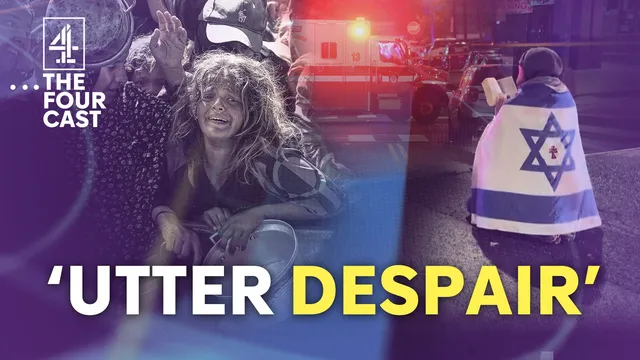
UN warns of severe starvation risks in Gaza amid ongoing blockade
2025-05-25 21:02- The United Nations reported a severe risk of starvation for thousands in Gaza due to ongoing aid blockades.
- Many families, like that of five-month-old Siwar Ashour, are facing malnutrition and a lack of basic supplies.
- Growing international condemnation of Israeli policies could lead to calls for a Palestinian state amidst the humanitarian crisis.
Express your sentiment!
Insights
In Gaza, the situation has deteriorated significantly due to a prolonged Israeli blockade that has lasted for 11 weeks. As a result, thousands of men, women, and children are facing severe starvation, according to reports from the United Nations. On the ground, families struggle with malnutrition and a lack of basic resources as the conflict continues to escalate. Reports indicate that around 80% of the region is designated as either a militarized zone or an area from which residents have been evacuated, contributing to the humanitarian crisis. One notable case is that of a five-month-old girl named Siwar Ashour, who exemplifies the dire circumstances many families are enduring. Upon leaving the hospital, she was discovered by a local journalist to be malnourished and lacking adequate baby formula due to the ongoing blockade. Her mother Najwa reported that even basic nutritional needs for herself and her daughter are unmet. The escalating sounds of warfare nearby further exacerbate their anxiety and plight, illustrating the daily struggles for survival amidst the chaos. International reactions to the blockade have included growing condemnation of Israeli Prime Minister Benjamin Netanyahu, with Western leaders increasingly voicing their concerns. The global community has also seen mounting calls to recognize a Palestinian state as a response to the evolving situation. The implications of these discussions and responses are significant, as the world grapples with the humanitarian fallout and the political ramifications of ongoing violence in the region. Overall, the humanitarian crisis in Gaza is a reflection of broader geopolitical tensions and conflicts. The combination of military action and isolation has led to a critical situation for millions living in the area. The lack of food, secure shelter, and access to healthcare has placed immense pressure on families struggling to survive. As the international community weighs its options, the fate of Gaza's residents hangs in the balance.
Contexts
The Gaza aid blockade has had a profound impact on the civilian population, leading to widespread humanitarian crises that have escalated since its inception. The blockade, enforced primarily by Israel and Egypt, restricts the flow of goods, services, and humanitarian assistance into the Gaza Strip. This has resulted in severe shortages of essential supplies, including food, medical equipment, and fuel, exacerbating the already dire living conditions for the over two million residents. Reports indicate that a significant portion of the population relies on international aid for basic sustenance, making the blockade's restrictions particularly devastating and undermining the community’s resilience. The UN and various humanitarian organizations have repeatedly highlighted the urgent need for the lifting or easing of these restrictions to facilitate essential aid and rebuild infrastructure that has been severely damaged by ongoing conflicts. The health sector in Gaza has been critically affected by the blockade, suffering from chronic shortages of medical supplies, advanced treatments, and qualified personnel. Hospitals operate under dire conditions, plagued by inadequate resources which compromise the quality of healthcare delivered to patients. A significant number of medical professionals have had to emigrate due to the deteriorating conditions and lack of professional development opportunities, further aggravating the situation. Children and vulnerable populations are disproportionately affected, with increasing rates of malnutrition and preventable diseases reported. The psychological toll of living under such conditions, compounded by repeated escalations in violence, has also led to growing mental health issues among the residents. In addition to the immediate humanitarian implications, the blockade's long-term consequences suggest a bleak future for Gazan society. Economic activity has been severely stifled, with unemployment rates soaring as businesses struggle to operate without reliable access to resources or markets. The agricultural sector, which once played a pivotal role in local livelihoods, has been decimated due to restrictions on exports and access to crucial inputs. Consequently, the economic despair has fostered a sense of hopelessness, contributing to social unrest and extremism as young people confront a lack of opportunities and a diminished quality of life. Efforts to improve the economic situation are frequently hampered by the political instability and the ongoing conflict, making sustainable development an elusive goal within the region. In conclusion, the Gaza aid blockade constitutes a significant obstacle to the wellbeing of civilians trapped within the territory. The implications are far-reaching, affecting health, economy, and social cohesion, leading to a cycle of dependency on aid and continued suffering. A concerted international effort is necessary to address the humanitarian needs and advocate for an end to the blockade, allowing for the restoration of normalcy and dignity for the people of Gaza. Without such intervention, the humanitarian crisis is likely to continue worsening, with dire consequences for future generations.